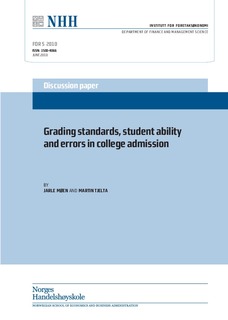| dc.contributor.author | Møen, Jarle | |
| dc.contributor.author | Tjelta, Martin | |
| dc.date.accessioned | 2010-11-14T20:28:17Z | |
| dc.date.available | 2010-11-14T20:28:17Z | |
| dc.date.issued | 2010-06 | |
| dc.identifier.issn | 1500-4066 | |
| dc.identifier.uri | http://hdl.handle.net/11250/164137 | |
| dc.description.abstract | Grades are important for admission of students in most higher education programmes. Analysing admission and
student performance data at a major Norwegian business school, we find that the grading practice of teachers at
regional colleges sending students to the school is affected by the average performance of the students being
graded. Teachers at colleges recruiting good students from upper secondary school tend to be strict in their
grading practice, while teachers at colleges recruiting less good students tend to follow a lenient practice. This
has implications for the interpretation of grades and hence for optimal admission procedures. We develop a
methodology to assess the consequences of differential grading standards. Approximately ten percent of the
students in our data are admitted at the expense of more competent students. We demonstrate costs for the school
admitting wrong students and in particular for the rejected students. | en |
| dc.language.iso | eng | en |
| dc.publisher | Norwegian School of Economics and Business Administration. Department of Finance and Management Science | en |
| dc.relation.ispartofseries | Discussion paper | en |
| dc.relation.ispartofseries | 2010:5 | en |
| dc.subject | grading practices | en |
| dc.subject | differential grading standards | en |
| dc.subject | admission policy | en |
| dc.title | Grading standards, student ability and errors in college admission | en |
| dc.type | Working paper | en |
| dc.subject.nsi | VDP::Samfunnsvitenskap: 200 | en |
